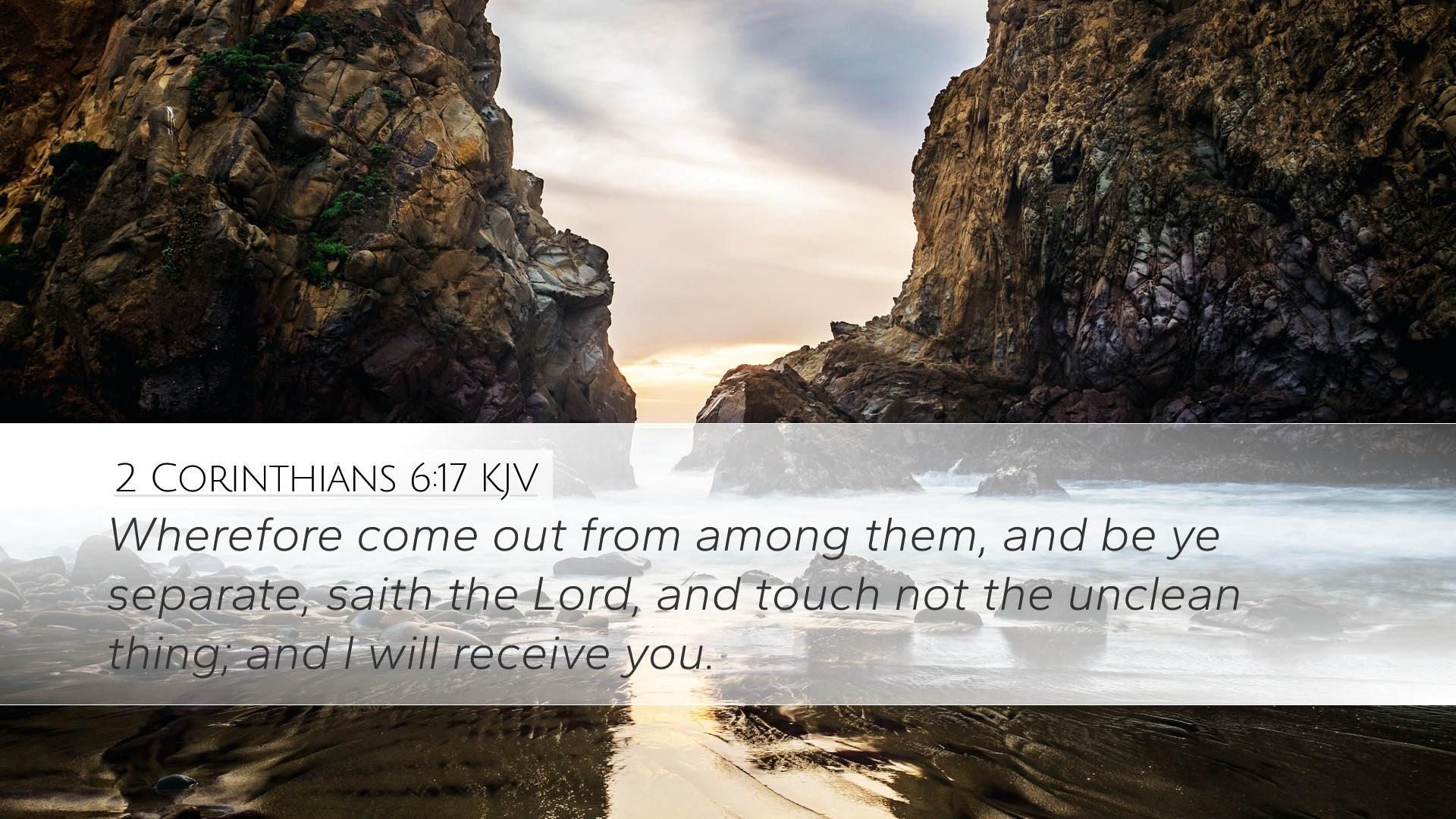Commentary on 2 Corinthians 6:17
Verse: "Wherefore come out from among them, and be ye separate, saith the Lord, and touch not the unclean thing; and I will receive you."
Introduction
This verse from 2 Corinthians 6:17 is a powerful exhortation by the Apostle Paul urging believers to maintain their distinctiveness in a world filled with moral and spiritual corruption. The call to separation is not merely a physical distancing but a spiritual and moral delineation aligned with God's will. This commentary synthesizes insights from public domain commentators such as Matthew Henry, Albert Barnes, and Adam Clarke, aiming to provide profound implications for pastors, students, theologians, and Bible scholars.
Historical Context
In the broader context of Paul's second letter to the Corinthians, he addresses various issues pertinent to the early church, including the challenges of immorality and idolatry. The Corinthian church faced substantial pressure from their surrounding culture, which was rife with pagan practices. Paul emphasizes the need for believers to be separate, drawing on Old Testament principles that underscore God's desire for holiness among His people.
Exegesis of the Verse
-
Call to Separation:
Paul instructs the Corinthians to "come out from among them." This phrase signifies a spiritual withdrawal from the surrounding corrupt influences. Matthew Henry comments on this by noting that the separation is not about physical distance alone but includes a moral and spiritual commitment to God's standards.
-
Divine Command:
The phrase "saith the Lord" reminds us that this call stems from divine authority. Adam Clarke emphasizes that it is God's imperative for His people to be separate. This is rooted in Old Testament scripture, particularly in Leviticus 11:44, which calls God's people to be holy because He is holy.
-
Touch Not the Unclean Thing:
Paul cautions against engaging with unclean things, reflecting a heightened awareness of moral purity. Albert Barnes elucidates this point by discussing the necessity for a believer to avoid not only participation in sin but even association with sinful practices, suggesting that the path to holiness requires vigilance.
-
Assurance of Acceptance:
The promise "I will receive you" provides profound encouragement. When believers separate themselves for God's service, they can rest assured of His acceptance and blessings. Matthew Henry notes that God’s reception is contingent upon genuine separation aimed at honoring Him.
Theological Implications
This verse illustrates several key theological principles regarding the relationship between God's holiness and the believer's conduct.
-
Holiness of God:
The demand for separation underscores God's holiness. He cannot coexist with sin; hence, His people must reflect His character in their lives. This theme echoes throughout the scriptures, as seen in 1 Peter 1:15-16.
-
Sanctification:
Sanctification is an ongoing process where a believer is set apart for God's purposes. Paul’s exhortation aligns with the theological concept that true faith manifests in a lifestyle of holiness, as illustrated by Clarke in his commentary on the nature of true separation.
-
Community Influence:
The call to come out emphasizes the believer's potential to influence and to be influenced by society. This interaction must be navigated carefully, as failure to remain distinct can dilute the witness of the church. Barnes reflects on the serious consequences of neglecting this call through historical examples of Israel’s entanglement with surrounding nations.
Pastoral Application
For pastors and church leaders, this scripture demands careful teaching about the nature of the Christian walk. The call to separation may be uncomfortable in contemporary contexts where inclusivity is often emphasized.
-
Teaching Holiness:
Churches should foster an understanding of holiness that reflects both personal and communal moral purity.
-
Encouraging Discernment:
Leaders can help congregants develop the discernment necessary for identifying unclean influences and encourage them to take active steps in their spiritual journey.
-
Modeling Separation:
Ultimately, leaders must model a life of separation, demonstrating reliance on God’s grace to pursue holiness in all aspects of life.
Conclusion
In summary, 2 Corinthians 6:17 commands an essential aspect of the Christian life: the call to come out from worldly influences and to be separate in moral conduct. This separation is a reflection of God's holiness and an expression of our identity as His people. As elucidated by Matthew Henry, Albert Barnes, and Adam Clarke, it stands as both a challenge and an assurance. The promise of divine acceptance follows the faithful commitment to live distinctively. These insights provide meaningful directions for pastors, students, and theologians as they seek to understand and apply Paul's powerful exhortation.


